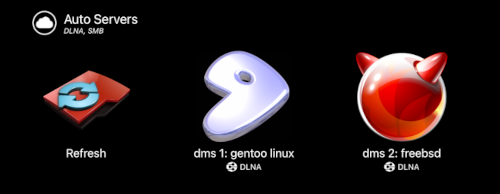dms is looking for funding for further development. See https://github.com/sponsors/anacrolix and the issues list if you have something specific in mind. Thank you for your support!
dms is a UPnP DLNA Digital Media Server. It runs from the terminal, and serves content directly from the filesystem from the working directory, or the path given. The SSDP component will broadcast and respond to requests on all available network interfaces.
dms advertises and serves the raw files, in addition to alternate transcoded streams when it's able, such as mpeg2 PAL-DVD and WebM for the Chromecast. It will also provide thumbnails where possible.
dms also supports serving dynamic streams (e.g. a live rtsp stream) generated on the fly with the help of an external application (e.g. ffmpeg).
dms uses ffprobe/avprobe to get media data such as bitrate and duration, ffmpeg/avconv for video transoding, and ffmpegthumbnailer for generating thumbnails when browsing. These commands must be in the PATH given to dms or the features requiring them will be disabled.
Assuming $GOPATH and Go have been configured already:
$ go install github.com/anacrolix/dms@latest
Ensure ffmpeg/avconv and/or ffmpegthumbnailer are in the PATH if the features depending on them are desired.
To run:
$ "$GOPATH"/bin/dms
dms is distributed as Docker Image. Serve Media in /mediadirectory using dms:
docker pull ghcr.io/anacrolix/dms:latest
docker run -d --network host -v /mediadirectory:/dmsdir ghcr.io/anacrolix/dms:latestA sample systemd .service file has been provided to assist in running DMS as a system service.
Install the provided service file to /etc/rc.d or /usr/local/etc/rc.d
add dms_enable="YES", and optionally dms_root="/path/to/my/media" and dms_user="myuser" to your /etc/rc.conf
- Probably all Panasonic Viera TVs.
- Android's BubbleUPnP and AirWire
- Chromecast
- VLC
- LG Smart TVs, with varying success.
- Roku devices
- Apple TV 4K via VLC and 8player
- iOS VLC and 8player
| parameter | description |
|---|---|
-allowDynamicStreams |
turns on support for .dms.json files in the path |
-allowedIps string |
allowed ip of clients, separated by comma |
-config string |
json configuration file |
-deviceIcon string |
device icon |
-deviceIconSizes string |
device icon sizes, separated by comma |
-fFprobeCachePath string |
path to FFprobe cache file (default "/home/efreak/.dms-ffprobe-cache") |
-forceTranscodeTo string |
force transcoding to certain format, supported: 'chromecast', 'vp8' |
-friendlyName string |
server friendly name |
-http string |
http server port (default ":1338") |
-ifname string |
specific SSDP network interface |
-ignoreHidden |
ignore hidden files and directories |
-ignoreUnreadable |
ignore unreadable files and directories |
-ignore |
ignore comma separated list of paths (i.e. -ignore thumbnails,thumbs) |
-logHeaders |
log HTTP headers |
-noProbe |
disable media probing with ffprobe |
-noTranscode |
disable transcoding |
-notifyInterval duration |
interval between SSPD announces (default 30s) |
-path string |
browse root path |
-stallEventSubscribe |
workaround for some bad event subscribers |
-transcodeLogPattern |
pattern where to write transcode logs to. The [tsname] placeholder is replaced with the name of the item currently being played. The default is $HOME/.dms/log/[tsname]. You may turn off transcode logging entirely by setting it to /dev/null. You may log to stderr by setting /dev/stderr. |
An example json configuration file:
{
"path": "/path/to/media/files",
"friendlyName": "dms",
"noTranscode": true,
"deviceIcon": "/path/to/icon.png",
"deviceIconSizes": ["48:512","128:512"]
}
DMS supports "dynamic streams" generated on the fly. This feature can be activated with the
-allowDynamicStreams command line flag and can be configured by placing special metadata
files in your content directory.
The name of these metadata files ends with .dms.json, their structure is documented here.
An example:
{
"Title": "My awesome webcam",
"Resources": [
{
"MimeType": "video/webm",
"Command": "ffmpeg -i rtsp://10.6.8.161:554/Streaming/Channels/502/ -c:v copy -c:a copy -movflags +faststart+frag_keyframe+empty_moov -f matroska -"
}
]
}
By default, dynamic content is treated as video. It is possible to specify a "Type" parameter with value "audio" or "video" to explicitly set this.

